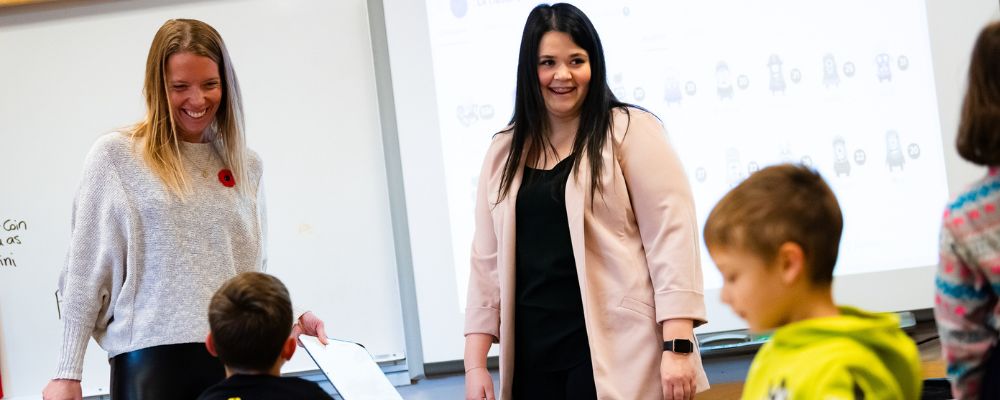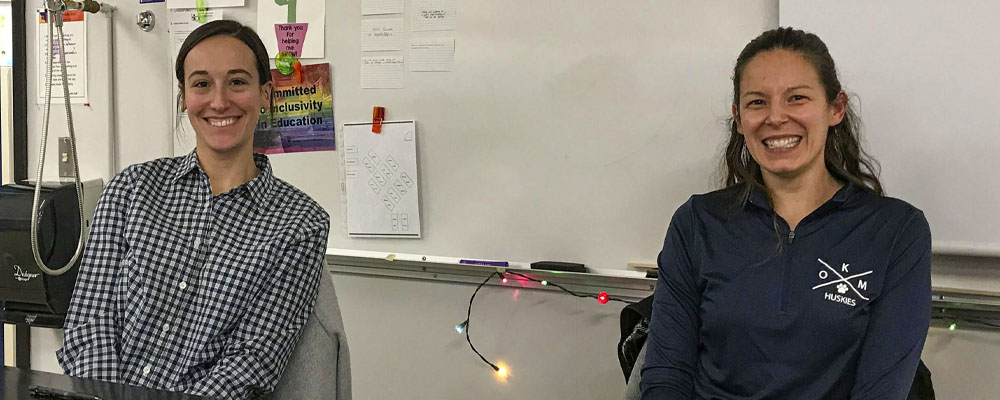Mentor Teachers

The Bachelor of Education program focuses on theory-practice connections, offers extensive practical experience, and fosters professional learning throughout ones’ career. An essential part of our program is our extensive practical experience, offering prospective teachers hands-on experience in the classroom. Our mentor teachers play a very important role in this experience and we are appreciative of all the knowledge and time they share with our candidates.
Become a Mentor Teacher
If you are interested in becoming a mentor teacher, we encourage you to submit an expression of interest. Please ensure you speak to your administrator prior to submitting the form
Field Experience Guide
The guide outlines key details about the field experience program at the Okanagan School of Education. It is intended to serve as a reference for mentors, administrators, faculty advisors, and Bachelor of Education students (year one candidates and year two interns).
Tuition Credits
Mentor teachers are eligible for 3.0 UBC Okanagan School of Education tuition credits if they host a BEd teacher candidate or intern for immersive field experiences. The tuition credits are valid for two years and are not transferable. Students are responsible for other applicable student fees.
The tuition credits will be issued in the spring and can be redeemed for UBC Okanagan School of Education’s Summer Institute in Education courses, Post-Baccalaureate Certificate and Diploma courses and Master of Education and Master of Arts in Education courses.
They cannot be redeemed for Doctor of Education or PhD courses, or courses that are not offered by the Okanagan School of Education.
Tuition Fee Certificates are given to mentor teachers in credit denominations to be used in lieu of tuition payments for most courses* offered by the Okanagan School of Education.
The Certificates are applied toward tuition costs. Other charges may apply that are the responsibility of the student. Check “Financial Summary” on your student account to view the details of the charges. Students may be able to opt out of some fees, please visit the UBC Okanagan Calendar Student Fees page for more information. A non-refundable registration deposit is required prior to registration in credit courses.
NOTE: Revenue Canada regards these certificates as a taxable benefit. A T4A will be issued mid to late February and downloadable via the Student Service Centre. A T2202A (Tuition and Education Amounts Certificate) will be issued mid to late February and downloadable via the Student Service Centre.
*can not be redeemed for Doctor of Education or PhD courses
- Register for the course you are interested in taking.
Note: Other charges may apply that are the responsibility of the student. Check “Financial Summary” on your student account to view the details of the charges. Students may be able to opt out of some fees, please visit the UBC Okanagan Calendar Student Fees page for more information. A non-refundable registration deposit is required prior to registration in credit courses. - No sooner than one month before the start of the course and no later than the Withdrawal date of the course confirm by email with the Okanagan School of Education Office, education.ubco@ubc.ca, that you are interested in using your tuition credits and confirm that you are registered in the course. In your email, please include:
- First and last name(s)
- UBC student number
- Course name, number & section # (to which you’d like the certificate applied)
- Program of study (eg. MEd-O, MA-O, DISE-O, select coursework only)
- We will then send you the official Tuition Fee Certificate with your certificate number, name, student number, course and section number on it, signed by the Director of Undergraduate
- Take your certificate in person or e-mail to Student Records & Financial Services as proof of payment. Make sure to sign the certificate. They will process your certificate for the credits indicated (keep a copy for your records).
- Take and enjoy your course! Thanks again for mentoring a BEd student from the Okanagan School of Education!
Note: Please keep your Certificate in a safe place, and note the expiry date. The Okanagan School of Education does not reissue certificates if they are lost or stolen. Certificates are non-transferable and have no cash surrender value.
Transformative teaching: Bringing equity and inclusion into the classroom
Interns can bring new energy, ideas and practices to a classroom.
The relationship between a teacher intern and their mentor can be an exceptionally transformative learning experience. Mentors play a vital role in our teacher education program as they help to guide interns’ learning and influence their identity as future teachers. Interns can bring new energy, ideas and practices to a classroom.
At Okanagan Mission Secondary School (OKM), Lindsay Ellis, intern, and Candace Sharko, mentor, have a great working relationship – that perhaps stems from some common traits, professional goals, and shared beliefs in promoting equity and inclusion in the classroom.
